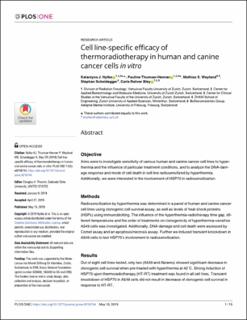Please use this identifier to cite or link to this item:
https://doi.org/10.21256/zhaw-19597Full metadata record
| DC Field | Value | Language |
|---|---|---|
| dc.contributor.author | Nytko, Katarzina J. | - |
| dc.contributor.author | Thumser-Henner, Pauline | - |
| dc.contributor.author | Weyland, Mathias S. | - |
| dc.contributor.author | Scheidegger, Stephan | - |
| dc.contributor.author | Rohrer Bley, Carla | - |
| dc.date.accessioned | 2020-03-05T10:12:57Z | - |
| dc.date.available | 2020-03-05T10:12:57Z | - |
| dc.date.issued | 2019 | - |
| dc.identifier.issn | 1932-6203 | de_CH |
| dc.identifier.uri | https://digitalcollection.zhaw.ch/handle/11475/19597 | - |
| dc.description.abstract | Objective: Aims were to investigate sensitivity of various human and canine cancer cell lines to hyperthermia and the influence of particular treatment conditions, and to analyze the DNA-damage response and mode of cell death in cell line radiosensitized by hyperthermia. Additionally, we were interested in the involvement of HSP70 in radiosensitization. Methods: Radiosensitization by hyperthermia was determined in a panel of human and canine cancer cell lines using clonogenic cell survival assay, as well as levels of heat shock proteins (HSPs) using immunoblotting. The influence of the hyperthermia-radiotherapy time gap, different temperatures and the order of treatments on clonogenicity of hyperthermia-sensitive A549 cells was investigated. Additionally, DNA damage and cell death were assessed by Comet assay and an apoptosis/necrosis assay. Further we induced transient knockdown in A549 cells to test HSP70’s involvement in radiosensitization. Results: Out of eight cell lines tested, only two (A549 and Abrams) showed significant decrease in clonogenic cell survival when pre-treated with hyperthermia at 42˚C. Strong induction of HSP70 upon thermoradiotherapy (HT-RT) treatment was found in all cell lines. Transient knockdown of HSP70 in A549 cells did not result in decrease of clonogenic cell survival in response to HT-RT. Conclusion: Tumor cell-type, temperature and order of treatment play an important role in radiosensitization by hyperthermia. However, hyperthermia has limited potency to radiosensitize canine cancer cells grown in a 2D cell culture setting presented here. DNA damage and apoptosis/necrosis did not increase upon combined treatment and cytosolic levels of HSP70 appear not to play critical role in the radiosensitization of A549 cells. | de_CH |
| dc.language.iso | en | de_CH |
| dc.publisher | Public Library of Science | de_CH |
| dc.relation.ispartof | PLOS ONE | de_CH |
| dc.rights | http://creativecommons.org/licenses/by/4.0/ | de_CH |
| dc.subject | Hyperthermia | de_CH |
| dc.subject | Radiation therapy | de_CH |
| dc.subject.ddc | 615: Pharmakologie und Therapeutik | de_CH |
| dc.title | Cell line-specific efficacy of thermoradiotherapy in human and canine cancer cells in vitro | de_CH |
| dc.type | Beitrag in wissenschaftlicher Zeitschrift | de_CH |
| dcterms.type | Text | de_CH |
| zhaw.departement | School of Engineering | de_CH |
| zhaw.organisationalunit | Institut für Angewandte Mathematik und Physik (IAMP) | de_CH |
| dc.identifier.doi | 10.1371/journal.pone.0216744 | de_CH |
| dc.identifier.doi | 10.21256/zhaw-19597 | - |
| zhaw.funding.eu | No | de_CH |
| zhaw.issue | 5 | de_CH |
| zhaw.originated.zhaw | Yes | de_CH |
| zhaw.pages.start | e0216744 | de_CH |
| zhaw.publication.status | publishedVersion | de_CH |
| zhaw.volume | 14 | de_CH |
| zhaw.publication.review | Peer review (Publikation) | de_CH |
| zhaw.funding.zhaw | Dynamic Thermal Dosimetric Concept for Evaluating Synergistic Effect of Combined Hyperthermia-Radiotherapy (RT-HT) | de_CH |
| zhaw.author.additional | No | de_CH |
| Appears in collections: | Publikationen School of Engineering | |
Files in This Item:
| File | Description | Size | Format | |
|---|---|---|---|---|
| 2019_Nytko-etal_Cell-line-specific-efficacy.pdf | 1.79 MB | Adobe PDF |  View/Open |
Show simple item record
Nytko, K. J., Thumser-Henner, P., Weyland, M. S., Scheidegger, S., & Rohrer Bley, C. (2019). Cell line-specific efficacy of thermoradiotherapy in human and canine cancer cells in vitro. Plos One, 14(5), e0216744. https://doi.org/10.1371/journal.pone.0216744
Nytko, K.J. et al. (2019) ‘Cell line-specific efficacy of thermoradiotherapy in human and canine cancer cells in vitro’, PLOS ONE, 14(5), p. e0216744. Available at: https://doi.org/10.1371/journal.pone.0216744.
K. J. Nytko, P. Thumser-Henner, M. S. Weyland, S. Scheidegger, and C. Rohrer Bley, “Cell line-specific efficacy of thermoradiotherapy in human and canine cancer cells in vitro,” PLOS ONE, vol. 14, no. 5, p. e0216744, 2019, doi: 10.1371/journal.pone.0216744.
NYTKO, Katarzina J., Pauline THUMSER-HENNER, Mathias S. WEYLAND, Stephan SCHEIDEGGER und Carla ROHRER BLEY, 2019. Cell line-specific efficacy of thermoradiotherapy in human and canine cancer cells in vitro. PLOS ONE. 2019. Bd. 14, Nr. 5, S. e0216744. DOI 10.1371/journal.pone.0216744
Nytko, Katarzina J., Pauline Thumser-Henner, Mathias S. Weyland, Stephan Scheidegger, and Carla Rohrer Bley. 2019. “Cell Line-Specific Efficacy of Thermoradiotherapy in Human and Canine Cancer Cells in Vitro.” Plos One 14 (5): e0216744. https://doi.org/10.1371/journal.pone.0216744.
Nytko, Katarzina J., et al. “Cell Line-Specific Efficacy of Thermoradiotherapy in Human and Canine Cancer Cells in Vitro.” Plos One, vol. 14, no. 5, 2019, p. e0216744, https://doi.org/10.1371/journal.pone.0216744.
Items in DSpace are protected by copyright, with all rights reserved, unless otherwise indicated.